
Baku, Azerbaijan, Nov.3
By Rashid Shirinov Trend:
Financial sectors of the countries in Central Asia are vulnerable to external shocks, the World Bank told Trend.
"These include commodity price volatility, decline in remittances inflows and exchange rate fluctuations that have negative consequences on the health of the financial sector and of the economy in general," the message said.
The WB noted that in Kazakhstan, for example, the banking sector has experienced two systemic crises in the last decade, with substantial fiscal costs. Financial sector weaknesses undermine Kazakhstan’s further development and constraints credit to productive sectors.
"As financial sector conditions in Kazakhstan curtail healthy market-based credit growth, the public sector increasingly plays a major role in financial intermediation, funding special lending programs and supporting weak banks," the WB said.
Among the ways of strengthening financial sector resilience in Central Asia, the WB mentioned strengthening Central Bank independence, improving financial oversight, putting in place an effective bank resolution system in line with international standards and addressing non-performing loans, as well as enhancing corporate governance and financial disclosure practices in private banks.
Follow Trend on Telegram. Only most interesting and important news
